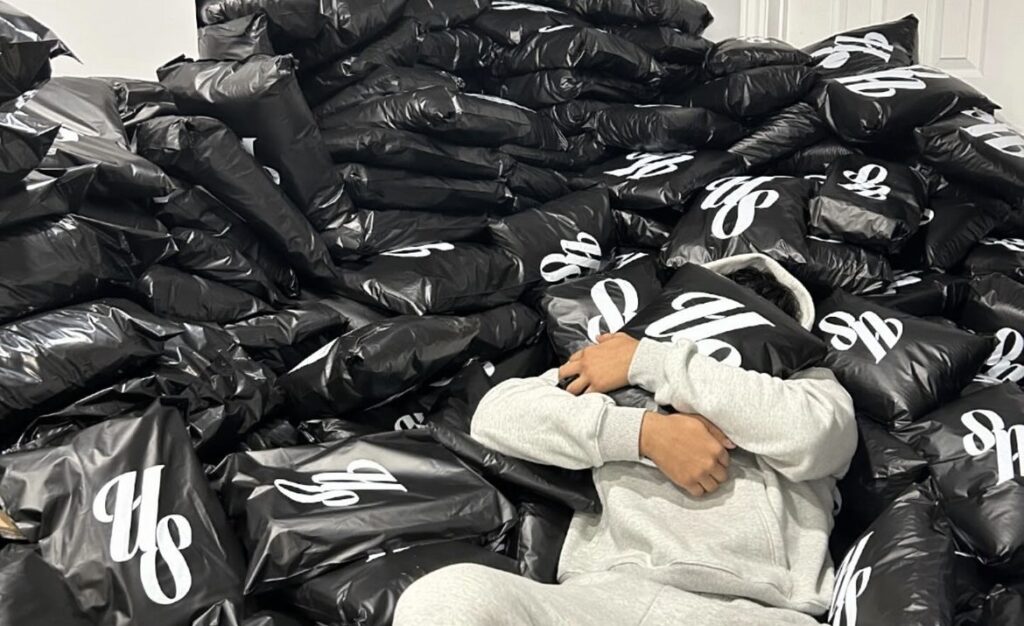A Professional believes that small social media brands cannot dominate the fashion industry.

Alessandro Videla, a first-year TMU student, is packaging his orders to ship out to his customers after a successful pre-sale for this brand, Up To Us.
During his shift at Costco, he had an epiphany: He hated working for someone and wanted to do something for himself, be his own boss, and set his own hours.
“I started my clothing brand. My goal was to grow my personal brand through TikTok or Instagram, but I mostly focused on TikTok. I knew that if I secured a strong fan base with my own fashion niche, I could definitely attract a lot of customers and have that stable customer base,” Videla said.
It is evident that there are so many different brands on social media platforms. While scrolling on Instagram and TikTok, you constantly see advertisements for brands you have never seen.
A student, Ryan Chan, says, “I tend to look at social media brands when I’m trying to buy clothes because the designs are much more unique.”
Since the growth of social media, an uncountable number of people have started their own clothing brands. Many of these brand owners see this as their chance to make something for themselves and expand their businesses in the future.
Dr. Taylor Bridges is a researcher focusing on sustainable production and consumption, the circular economy, and the fashion industry. In one of her publications, she explores the influence of social media on fashion. https://opus.lib.uts.edu.au/handle/10453/174984
I had the chance to ask personally about the impact the fashion industry experienced with the growing usage of social media.
She said, “The main thing that transitioned from magazine or newspaper to social media is that it really changed marketing from a one-way to a two-way communication. With social media marketing, anybody can do it. So we’ve seen the rise of influencers, but now, they are obviously really prominent individuals with millions of followers. But we’ve also even seen micro-influencers. And this is something that ultra-fast fashion brands engage with quite successfully.”
Dr. Bridges studied small independent fashion brands for half of her career and concluded that it is difficult for them to surpass big corporate brands.
She said, “The difference or a key challenge is there’s so much competition for attention that you can be like the best designer in the world working with really beautiful materials, and you have a great story behind it, like a social enterprise or something like that. But then, really, how do you start standing out in the crowd? Small businesses often don’t have a marketing team in the first place to kind of be doing that engagement. If we think of a big brand that has a whole team dedicated to doing this or even smarter if they’re working with mic influencers who will basically take payments and clothes to do this kind of labour. So, I think it acts like it really is a hard time to be a small brand right now. Like even though there are channels to communicate your ideas and it’s probably never been cheaper. There still is a significant cost to it.”
Videla is the perfect example of what Dr. Bridges mentioned. He is the only one working for the brand with some help from his friends.
“I definitely have a lot of future plans for my brand, especially wanting to grow my team. Currently, it’s just me operating most of my operations. I have a couple of people helping me, too. My friend Elmo, who is my main photographer and videographer, helped me out a lot. But I would definitely love to grow my brand’s team, especially for my summer drop coming out in May and my future winter and fall drop next October,” Videla said.
Dr. Bridges has not seen any Canadian social media brands become big global brands. Canada Goose is the most significant Canadian brand that has succeeded but has not worked with social media influencers.
“It’s very hard for Canadian brands to build a successful business domestically. The Canadian culture is really that, like you need to make it big abroad before Canadian kind of consumers or retailers get excited. So yeah, that often means Canadians desire to go abroad.” she said.

